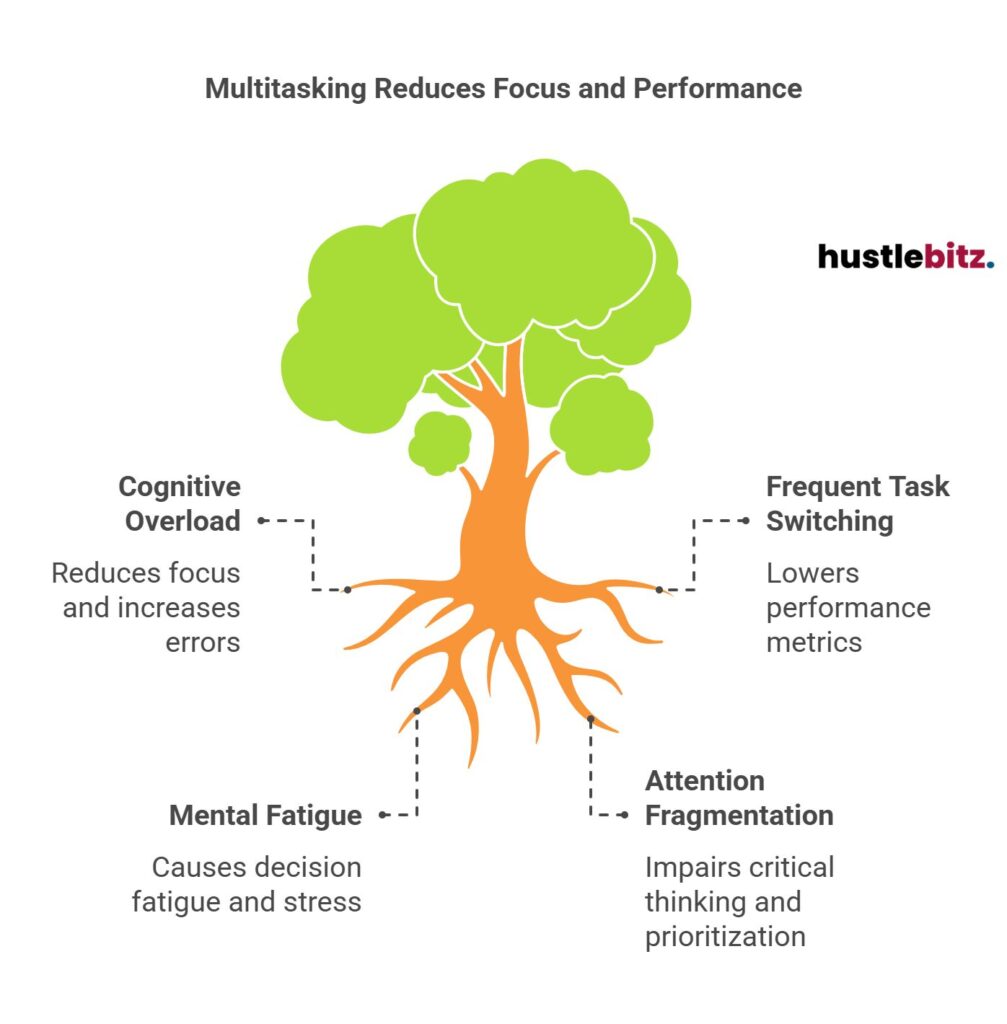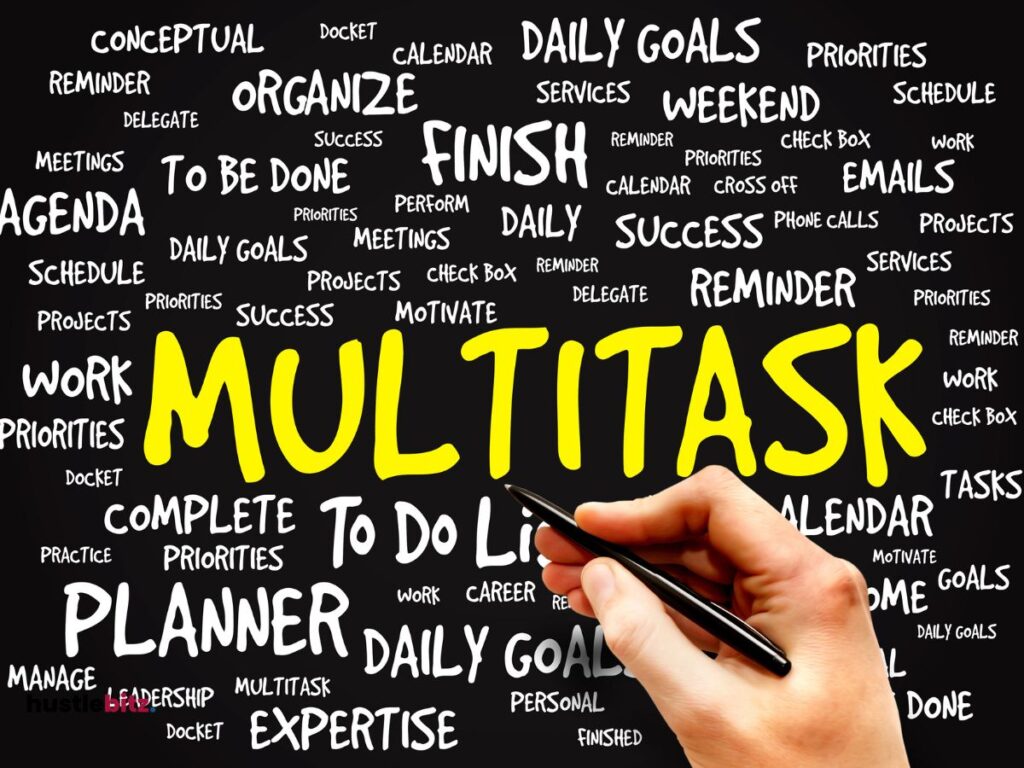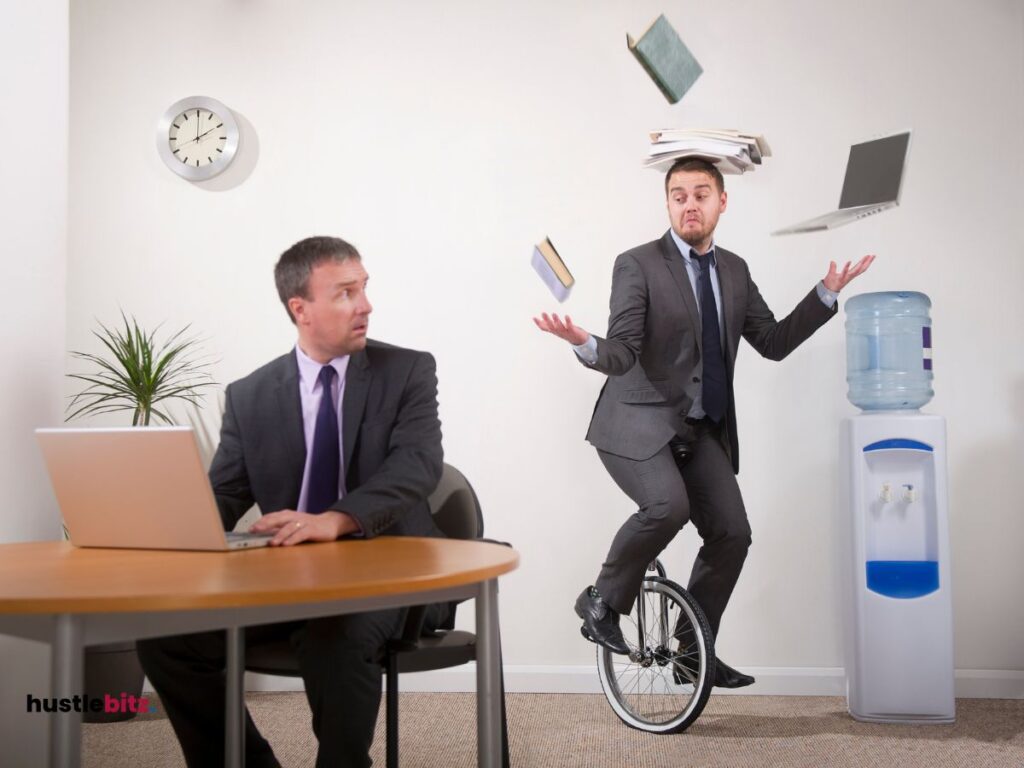Multitasking can severely undermine productivity by fragmenting attention and increasing cognitive strain. With the brain’s limited capacity, juggling multiple tasks often leads to cognitive overload, resulting in decreased efficiency and heightened error rates. This constant task-switching not only saps focus but also induces decision fatigue, impairing judgment and creativity. As a result, essential tasks may be overlooked, leading to subpar work quality and performance. Additionally, the mental and emotional exhaustion from multitasking can exacerbate stress and burnout. Understanding these detrimental effects is crucial; further insights may reveal effective strategies to enhance focus and productivity.
Key Takeaways
- Multitasking leads to cognitive overload, reducing focus and increasing errors due to divided attention among tasks.
- Frequent task switching results in lower performance metrics and hampers sustained concentration, contributing to inefficiency.
- Mental fatigue from multitasking activates stress responses, causing decision fatigue and decreased mental clarity.
- Attention fragmentation impairs critical thinking and task prioritization, leading to overlooked essential tasks and lower work performance.
- Strategies like mindfulness and time blocking can help mitigate the negative effects of multitasking and enhance productivity.

The Myth of Multitasking: Why Doing More Isn’t Always Better
Despite the common belief that multitasking enhances productivity, research indicates that attempting to manage multiple tasks simultaneously often leads to decreased efficiency and increased errors. The phenomenon of task juggling can create cognitive overload, overwhelming the brain’s capacity to process information effectively. This overload triggers a performance decline, as individuals struggle to maintain their attention span across various tasks.
Many fall victim to productivity myths that glorify multitasking as a valuable skill. In reality, these efficiency traps can lead to significant decision fatigue, where the quality of choices deteriorates due to mental exhaustion. As people switch between tasks, their error rates escalate, resulting in a loss of mental clarity and focus. Instead of boosting productivity, multitasking often produces the opposite effect.
Implementing focus strategies can counteract the detrimental effects of multitasking. By prioritizing single-tasking and allocating dedicated time for each task, individuals can enhance their concentration and reduce the likelihood of mistakes. This approach fosters a more engaged mindset, allowing for deeper cognitive processing and improved overall performance.
How Multitasking Impacts Cognitive Function and Focus
Multitasking significantly undermines cognitive function and focus, as the brain struggles to manage competing demands and maintain optimal performance levels. This phenomenon occurs due to increased cognitive load, which can overwhelm the brain’s processing capabilities. As individuals attempt to juggle multiple tasks, their attention span diminishes, leading to task interference and a detrimental focus shift.
The repercussions of multitasking extend beyond immediate productivity. Notably, it can result in:
- Performance decline: The quality of work suffers as the brain divides its resources among various tasks.
- Memory retention issues: Information may be poorly encoded or forgotten when attention is spread too thin.
- Information overload: An excess of stimuli can hinder decision-making and critical thinking.
- Reduced mental clarity: The brain’s capacity to process information effectively is compromised, clouding judgment.
- Limited cognitive flexibility: The ability to adapt to new tasks or information is severely restricted.
As these factors intertwine, the cumulative effect can lead to a significant drop in overall productivity. Individuals may find themselves expending more effort yet achieving less.
Consequently, fostering an environment that promotes single-tasking can enhance focus and cognitive function. By minimizing distractions and concentrating on one task at a time, individuals can improve their performance and regain mental clarity, ultimately leading to greater satisfaction in their work and daily activities.
The Science Behind Multitasking: What Research Reveals

Research indicates that the human brain is inherently limited in its ability to process multiple streams of information simultaneously, leading to decreased efficiency and performance when multitasking. Neuroscience studies have consistently shown that engaging in dual tasking can result in cognitive overload, ultimately compromising our attention span and the quality of our work. When individuals attempt to juggle several tasks, the brain’s activity becomes fragmented, impairing effective information processing.
Task engagement is significantly impacted by multitasking, as frequent switching between activities requires mental resources that could otherwise be devoted to a single task. This division of focus can lead to lower performance metrics, as individuals struggle to maintain high levels of concentration. Research highlights that even brief distractions can hinder brain activity related to sustained focus, contributing to a cycle of inefficiency.
Moreover, focus training techniques are often recommended to enhance individual productivity by promoting better time management and reducing the temptation to multitask. By concentrating on one task at a time, individuals can experience improved task engagement and more effective information processing, ultimately leading to higher quality outcomes.
The evidence suggests that prioritizing singular focus over multitasking may not only enhance performance but also mitigate the cognitive strain associated with juggling multiple responsibilities. In an increasingly demanding work environment, understanding the science behind multitasking can empower individuals to make informed choices about their productivity strategies.
Quality Vs. Quantity of Work

Balancing quality and quantity of work is essential for maximizing productivity and achieving sustainable results in any professional setting. The age-old debate of quality over quantity highlights that while completing numerous tasks may seem productive, it often compromises the effectiveness and depth of the work produced. Emphasizing quality fosters a productivity mindset that ultimately leads to better outcomes.
To truly enhance productivity, professionals should focus on effective prioritization and the adoption of focus strategies that support deep work. Prioritizing high-impact tasks allows for better attention management and optimal performance. Engaging in single-task benefits can significantly improve workflow efficiency by minimizing distractions and promoting a more meaningful engagement with each task.
Consider the following strategies to maintain a balance between quality and quantity:
- Embrace deep work: Dedicate uninterrupted time for complex tasks to enhance creativity.
- Implement attention management techniques: Use tools like the Pomodoro Technique to maintain focus.
- Set clear goals: Define what success looks like for each task to ensure quality.
- Regularly review progress: Reflect on completed tasks to identify areas for improvement.
- Cultivate a productivity mindset: Prioritize meaningful tasks that align with long-term objectives.
Multitasking and Mental Fatigue: The Toll on Your Brain

Engaging in multiple tasks simultaneously can lead to significant mental fatigue, undermining the quality of work and overall productivity. This phenomenon, often referred to as mental overload, results from the brain’s struggle to manage attention fragmentation. As tasks compete for cognitive resources, individuals experience increased cognitive strain, leading to brain fatigue.
The body’s stress response is activated during multitasking, contributing to decision fatigue and further exacerbating information overload. This chronic state of cognitive exhaustion often manifests as performance decline, as the ability to focus becomes depleted. Consequently, the productivity drain experienced by multitaskers can be substantial, with errors and inefficiencies becoming more prevalent.
To illustrate the impact of multitasking on mental fatigue, consider the following table:
| Aspect | Effect of Multitasking |
| Mental Overload | Difficulty processing information |
| Cognitive Strain | Increased error rates |
| Attention Fragmentation | Reduced focus on tasks |
| Decision Fatigue | Slower decision-making speed |
The Emotional Consequences of Constant Multitasking

Constant multitasking can lead to heightened feelings of anxiety and stress, as individuals struggle to meet the demands of competing tasks while managing their emotional well-being. The constant pressure to juggle various responsibilities can result in emotional burnout, diminishing one’s ability to maintain a healthy work-life balance. As anxiety levels rise, individuals may experience cognitive dissonance, where the desire to perform well conflicts with the overwhelming nature of their tasks.
This emotional strain can manifest in several ways:
- Increased productivity anxiety, leading to a fear of underperformance
- Impaired mental clarity, making it difficult to focus on any single task
- Strained relationships due to reduced attention and engagement with others
- Difficulty in practicing effective stress management techniques
- Erosion of emotional resilience, making it harder to cope with challenges
These emotional consequences not only affect personal well-being but also hinder overall productivity. The inability to concentrate and the constant sense of urgency can create a vicious cycle, where individuals feel trapped in their multitasking efforts.
By integrating mindfulness practices, such as meditation and deep-breathing exercises, individuals can cultivate a greater sense of presence and reduce their anxiety levels.
Ultimately, recognizing the emotional consequences of constant multitasking is crucial for fostering mental clarity and enhancing emotional resilience. Prioritizing focused work can lead to improved productivity and a healthier balance in professional and personal life.
Why Task Switching Drains Your Efficiency and Energy

The emotional toll of multitasking often leads to frequent task switching, which significantly undermines both efficiency and energy levels. This constant shifting not only fragments our focus but also contributes to cognitive overload, resulting in energy depletion and reduced mental clarity. As we juggle multiple tasks, we encounter attention residue—the leftover thoughts from the previous task—which hampers our ability to concentrate on the current one. This fragmentation of focus can lead to workflow disruption, making it increasingly difficult to maintain a productive rhythm.
The impact of task switching extends beyond immediate distractions, contributing to decision fatigue. As our brains grapple with numerous choices, the mental toll can manifest as productivity loss, ultimately affecting our time management strategies. The following table illustrates the detrimental effects of task switching on productivity:
| Effect of Task Switching | Description | Consequences |
| Focus Fragmentation | Difficulty in concentrating on one task | Reduced task quality |
| Energy Depletion | Increased mental strain and fatigue | Lower overall performance |
| Decision Fatigue | Overwhelm from constant choices | Impaired judgment and efficiency |
The Hidden Costs of Multitasking on Your Productivity

How does multitasking subtly erode our productivity without us even realizing it? The hidden costs of multitasking are often overlooked, yet they can significantly impact our time management and overall work performance.
Engaging in multiple tasks simultaneously increases cognitive load, leading to diminished attention span and increased stress levels. These productivity barriers create workflow disruptions, making it challenging to prioritize tasks effectively.
The repercussions of multitasking manifest in several ways:
- Decreased Mental Clarity: Juggling tasks can cloud our focus, making it harder to think critically.
- Increased Decision Fatigue: Constantly switching between tasks drains mental energy, impairing our ability to make sound decisions.
- Impaired Task Prioritization: Multitasking often leads to misjudged priorities, causing us to overlook essential tasks.
- Lowered Work Performance: With divided attention, the quality of output may suffer, resulting in errors and inefficiencies.
- Heightened Stress Levels: The pressure to perform multiple tasks can lead to burnout and decreased motivation.
Ultimately, the hidden costs of multitasking hinder our ability to work effectively, reducing our productivity over time.
How to Break the Multitasking Habit and Improve Your Focus

Recognizing the detrimental effects of multitasking is the first step toward cultivating focused work habits that enhance productivity and mental clarity. To break the multitasking habit, individuals can employ several effective strategies. Mindfulness techniques, such as meditation and deep breathing, can help train the mind to sustain attention on a single task, thereby reaping the single tasking benefits of heightened concentration and improved cognitive performance.
Implementing time blocking can further optimize productivity by allocating specific time slots for dedicated tasks. This prioritization strategy minimizes the temptation to switch between activities, fostering an environment conducive to focused work. Additionally, distraction management is crucial; consider conducting a digital detox by limiting notifications and social media interactions that often fragment attention.
Utilizing productivity tools can also aid in maintaining focus. Apps that promote attention training can help track work sessions and remind users to stay on task. Furthermore, optimizing your environment—by reducing clutter and creating a designated workspace—can enhance concentration and efficiency.
Ultimately, it is about committing to a lifestyle change that prioritizes focused work over the allure of multitasking. By integrating these practices, individuals can gradually build a habit of single tasking, leading to improved productivity and a greater sense of accomplishment in their professional and personal lives.
Embracing these strategies will not only enhance performance but also foster a more mindful approach to daily tasks, thus paving the way for sustained success.
Final Thoughts
Multitasking, though often perceived as a means to increase productivity, can actually be counterproductive by fragmenting focus, increasing cognitive load, and leading to mental fatigue. By recognizing the hidden costs of juggling multiple tasks, individuals can take proactive steps to improve their focus and overall efficiency. Embracing strategies like single-tasking, mindfulness, and time blocking can help shift from the chaos of multitasking to a more mindful and effective approach to work. Remember, productivity isn’t about doing more at once; it’s about doing what matters most with full attention and clarity. Prioritize focus, and you’ll see significant improvements in both the quality of your work and your mental well-being.




